Are you a current student?

ACM30122 Certificate III in Animal Care Services
(ANIMAL CARE)
Price starting at:
$6430 or
$207.80 /fortnight
PRICE INCREASE ALERT!
Course prices will increase in 2024. Enrol now to lock in the current price.
Enrolment for next intake closes in:
ENROLMENTS & INTAKES
- Intakes start monthly, beginning on the first Monday.
- Enrolments close on the 15th day of the month prior unless filled early.
- Places are limited each month. If an intake is full, you’ll automatically be placed in the next available intake.
- *NEW* Immediate Course Start: Pay your tution in full and start your studies the following business day! No waiting for the next intake.
Entry Requirements:
- 18 years of age or older
- Year 10, or higher
- Not currently at school
- Able to complete 20 days clinical placement
- Access to computers and the internet
Duration:
18 months
language:
English
Access to our Online Learning Center:
Yes
Printed Learner's Guides:
Yes
Need to attend campus:
No
Schedule type:
Flexible. Study plan provided

DISCOUNT ON WORKSHOPS:
Yes

Not sure if this is the right course for you?
Answer a few easy questions and find out in less than a minute.
find out nowStart your Vet Nurse career today
This ACM30122 Certificate III in Animal Care Services (Animal Care) is designed to give you the practical skills and knowledge you need to start your career as a Veterinary Nurse. Veterinary Nurses are an important part of the veterinary team. They provide advice and support to clients, help veterinarians with procedures and treatment, and keep the clinic running smoothly.
If you’re not yet working in a veterinary clinic but are dedicated to becoming a veterinary nurse – this is the course you need. It covers the majority of the first year of the ACM40418 Certificate IV in Veterinary Nursing, so you’re actively working towards your dream of becoming a qualified veterinary nurse.
You’ll graduate with some great skills and knowledge for helping animals and their owners. ACVN Nurses are well regarded in the industry, so you’ll be adding to your employability too.
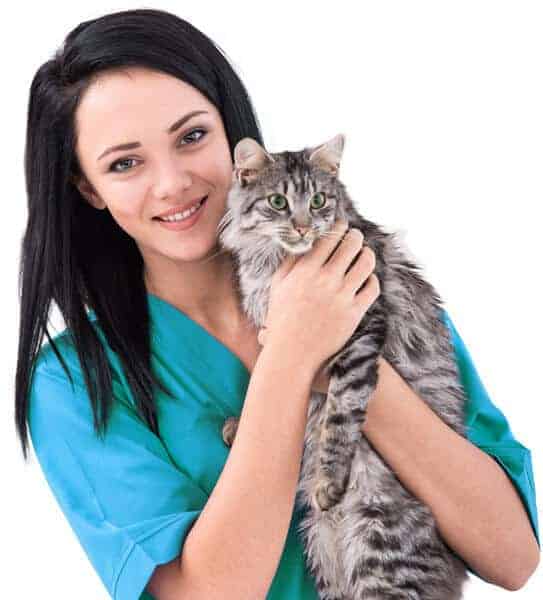
Where other ACM30122 Certificate III in Animal Care Services courses offer a general animal care course, ours is 100% veterinary nursing focused, so you can get a jump start on your veterinary nursing career. We have structured the course to ensure you are working towards your ACM40418 Certificate IV in Veterinary Nursing with the flexibility necessary to fit around your existing commitments.
Please note: As part of the course you’ll be required to complete a minimum 20 days of work experience placement, with at least 10 days in a Veterinary clinic and the other 10 days in any other animal care facility that houses and feeds animals. Whilst there are some conditions on when and where you can perform this, we are very flexible so you can fit it in around your schedule. We have a Placement Assistance Program in place to help you with finding placement.
This ACM30122 Certificate III in Animal Care Services (Animal Care) is offered by UQ Skills (RTO 1511) with the expert training, assessment, recruitment and support services provided by ACVN.
apply now
Direct entry available!
You do not need a ACM20121 Certificate II in Animal Care first.
To be eligible to enrol in this course, you must:
- Be at least 18 years of age.
- Have successfully completed Year 10, or equivalent (and not be currently at school).
- Be able to undertake 20 days of work experience placement, with at least 10 days in a Veterinary clinic and the other 10 days in any other animal care facility that houses and feeds animals.
- Have access to computers and the internet as this is an online course.
Please note:
As part of the course you’ll be required to complete a minimum 20 days of practical work experience. A work placement day is 7.5 – 8 hours long.
Placement 1 (10 days) can be undertaken in any animal care facility (boarding, grooming, daycare, breeding kennels), as long as there are dogs and cats that are fed.
Placement 2 (10 days) must be undertaken in a veterinary clinic. You can do all 20 days in a vet clinic if you want!
Whilst there are some conditions on when and where you can perform this, we are very flexible so you can fit it in around your schedule. We have a Placement Assistance Program in place to help you with finding placement.
apply now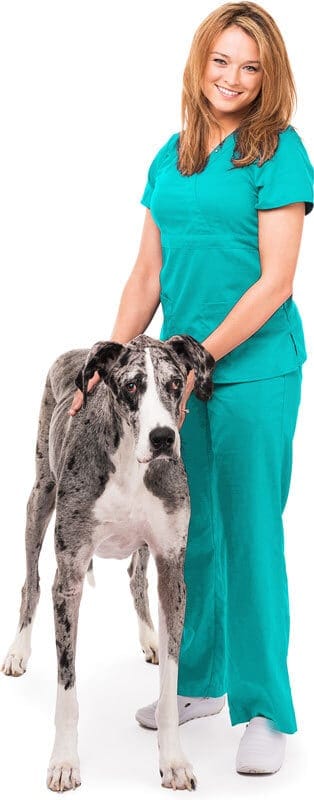
ACM30122 Certificate III in Animal Care Services
For this qualification to be awarded, you must complete 17 units of competency. Seven of these are core units, and the remaining ten are electives.
We have set the electives to suit veterinary nursing, and they cannot be changed as they are integrated into our subjects.
The core units you will cover within your subjects are:
- ACMBEH301 Identify behaviours and interact safely with animals
- ACMGEN315 Communicate effectively with clients and team members
- ACMGEN303 Assess welfare status of an animal
- ACMGEN304 Promote positive wellbeing for self and others in animal care workplaces
- ACMGEN309 Provide basic animal first aid
- ACMINF301 Comply with infection control policies and procedures in animal care work
- ACMWHS301 Contribute to workplace health and safety processes
Your electives are:
- ACMBEH302 Provide enrichment for animals
- ACMGEN314 Identify animal anatomy and physiology for animal care work
- ACMGEN311 Maintain and monitor animal health and wellbeing
- ACMGEN312 Provide nutritional requirements for animals
- ACMGEN205 Source and provide information for animal care needs
- ACMSPE316 Provide general care of domestic dogs
- ACMSPE317 Provide general care of domestic cats
- BSBXTW301 Work in a team
- ACMSUS401 Implement and monitor Implement and monitor environmentally sustainable work practices
- ACMVET202 Carry out daily practice routines
Enrolling is very simple!
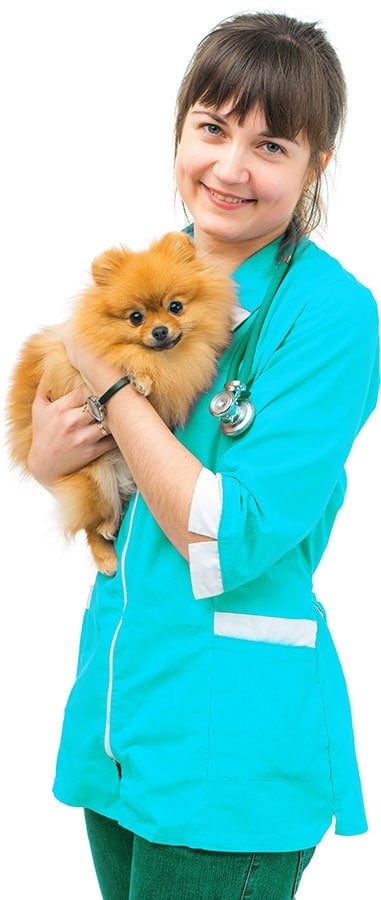
- Click on the ‘Apply Now’ button below.
- Fill in our 5 minute application form.
- Check your email account for the acceptance email within 1 to 2 business days. It will include an enrolment link.
- Fill in the online enrolment form and select your payment method. Instalment plans are available.
Once your enrolment and payment has been processed, you will receive an email from us with all the information you need to access the Learning Centre.
Your learning material folders will arrive by overnight courier after you’ve completed your Student Induction module.
apply nowNationally Recognised Training
This qualification is delivered by ACVN on behalf of the University of Queensland, trading as UQ Skills, RTO ID: 1511. UQ Skills is the Principal RTO and this course is on the UQ Skills scope of registration, as documented through a written third party agreement. For more information refer to the FAQ.


Frequently asked questions
If you’re employed in a clinic as a veterinary nurse and have at least 12 months of experience, you don’t. You can apply for the Cert IV through ‘direct entry’ which is where we assess that you have the same skills and knowledge as someone who has finished a Certificate II in Animal Studies/Care.
When you’re not already employed, then it’s your pathway to meet Cert IV entry requirements.
This ACM30122 Certificate III in Animal Care Services (Animal Care) is designed to give you a giant head start with your ACM40418 Certificate IV in Veterinary Nursing qualification. Once you complete the Cert III, which is an 18 month course, you are eligible to enrol in the Cert IV provided you have secured a job working in a vet clinic (many of our students do get jobs during their Cert III).
You’ll receive lots of credits once you graduate from your Certificate III, which will shorten your Certificate IV study time and cost.
We start student intakes off in the first week of every month. Spaces are limited on each intake, so it’s advisable to get your application and enrolment in quickly if you’re keen to start asap.
We look at applications every day and process acceptance emails. Once you receive your enrolment pack, the enrolment process can take a few days to complete. You can scan and email your enrolment form to speed it up.
Each student studies differently.
Most students need to dedicate around 10-15 hours per week to their studies.
We’ll give you a suggested timetable to guide you through completing your studies within the 18 months allocated. If you need, you’re able to extend your course past this, but be aware a fee will apply.
Some students finish the course in under 18 months, you can too if you wish. The trick is time management. Put dedicated study time aside each week and it’s achievable.
The ACM30122 Certificate III in Animal Care Services (Animal Care) is a ‘blended’ course. This means there is an online or distance component as well as a practical hands-on component in a veterinary clinic or other approved animal care workplace.
Our online student ‘Learning Centre’ along with our printed resources means you can study from where you like. Sunny day? Pop outside and study whilst watching the dogs play.
We’ll give you a timetable to help you structure your study plan. We recommend allowing dedicated time each week to ensure you stay on track, but it is self paced. So there is no stress of missing a deadline.
Once the course starts, you’ll receive printed learner’s guides, which will guide you through your studies and prepare you for assessments. You will also need to purchase a veterinary nursing textbook (allow around $130). You’ll also have access to the extra study resources available via our ‘Learning Centre’ online.
In the Learning Centre, you’ll find:
- Learning activities to help you remember everything
- Interactive learning modules
- Videos showing you how to perform tasks
- Recorded lectures to learn even more
- Links to upload your assessments.
Each subject contains various assessment tasks:
- Expect to complete written assessments like assignments, case studies, and reports.
- We include multiple choice learning activities so you can check your own learning throughout the course.
- Workplace-based assessments for practical skills will be completed during your Work Placements and involve some video assessments and a logbook. We provide comprehensive instructions on what to include, so don’t feel stressed about having to video yourself performing tasks.
- On average, expect to submit one short assessment or learning activity task each week to stay on track. Larger assessment tasks are required towards the end of the course.
We also run optional workshops around the country, where you can get more practice and experience. Boost your resume and learn more towards your qualification at the same time.
Assessments are not only about assessing you, they are a valuable learning tool. As you complete them, you’ll learn more than just going through the reading materials alone.
We use a range of assessment types and match these to what is the best way to capture your new skills and knowledge.
Written Assessments
Every subject has some form of written assessment. We use short answer questions, scenarios and short case studies about the patients you nursed in your clinical placement.
Our Nurse Educators will provide thorough feedback on your assessments, including hints and tips and further learning opportunities. Anytime you need help with an assessment, you just contact the Nurse Educators through our Student Assist options.
Clinical Skills Assessment
Veterinary Nursing is a practical job, so we must assess your clinical skills.
In the clinic, you’ll be recording your participation in various tasks and nursing care through short forms called Key Skills. These showcase what you’ve been learning in the clinic and will be ‘signed off’ by your Clinical Mentor. You’ll also complete some case diaries, with photos of you performing skills and short descriptions.
Lastly, to ensure you graduate with the quality expected of ACVN Nurses, you’ll also submit some short videos of you performing vet nursing tasks. Again, Nurse Educators will provide thorough feedback on your learning and skills. Don’t be daunted by video assessment, they are a relaxed form of assessment. We love it when students leave in their bloopers. We provide full instructions. Some can be done at home to free up clinic time for more learning.
Alternatively, we can send in a Nurse Educator to perform a workplace assessment. This option does attract extra fees and you may need multiple visits across the course. Unlike video assessments where you can restart and try again if something doesn’t go to plan, your workplace assessment is a final assessment. Many students find video assessment less daunting than having a Nurse Educator watching their every move in clinic.
We’re about veterinary nursing. Full stop. We live and breathe it.
For us, training veterinary nurses is not just about money. It’s how we can ensure best practice nursing care for animals everywhere. We’re here for the animals.
At ACVN, you have a name not a student number. We get to know all our students really well and love sharing in your achievements.
We care about you and your career. We want you to be job ready, employable and enjoying a long career in veterinary nursing. Some of our graduates love us so much, they’ve come to work for us.
Our student to educator ratio is the envy of many colleges. Because of this, your assessments are marked quickly and the feedback you receive is specific to you and designed to help you learn. The Nurse Educators are available to help you when you need it.
At our college, you’ll be a part of a group of students who are considered amongst the best in the country.
Yes! Becoming a qualified and employed veterinary nurse is your goal. The Cert III is your pathway into the Certificate IV in Veterinary Nursing. It allows you to meet entry requirements for the Cert IV and study subjects that credit over at the same time. This means Cert IV is cheaper and shorter.
The Cert II in Animal Care does not provide the same level of credits, so you’ll have more work to complete to gain your Cert IV.
Many of our students obtain employment as a direct result of their studying our Certificate III in Animal Care Services. ACVN Nurses and graduates are highly sought after by many employers. They love the level of knowledge and skill you’ll graduate with. Of course, there’s more to landing a job than just qualifications – all the standard rules about presentation and personality still apply.
Employers love ACVN nurses.
This will depend on what version of the Certificate III in Animal Care Services you have completed. We have had several versions over the years incorporating different units and subjects.
Generally speaking, the Cert IV is around 35% cheaper and study time of just over one year instead of two – if you have completed your Certificate III with ACVN.
Yes and no. Confused?
All training providers award qualifications with a standardised name – like the ACM30122 Certificate III in Animal Care Services (Animal Care). There are rules we all follow about the minimum requirements for graduation.
What differs is the education you get during the course. Each providers course content, assessments, delivery and support varies. No two providers deliver the exact same course. It’s just the name that’s the same.
We find many employers will actively seek out our graduates as they love the level of knowledge and ability our students have. In fact, we have several employers who will call us to advertise jobs to our students directly.
Comparing providers is a little like comparing fruit. Apples and oranges are very different – despite both being fruit. If quality and employability is what you want from your studies, then you want to be an ACVN Nurse.
Some students are lucky to have credit transfers from their previous studies. As each provider can choose different units to make up a qualification, each student has different credits, even if they completed the same qualification. Confused? Don’t worry. We can handle it all for you.
To apply credits, and work out your cheaper course cost and reduce study plan, we need to see the official transcript showing your units and results. This could be on the back of your certificate, or a separate document. You can also obtain a copy from the training provider.
Shoot this through to us and we’ll work out your personal study options.
Yes! We absolutely welcome overseas students, as long as you are remaining in your home country. If you wish to come to Australia to study, you’ll need to find a CRICOS registered provider. These are the only institutions approved for international student visas.
We have had students in many countries including America, Canada, Singapore, Japan, China, Portugal, Cyprus and South Africa, just to name a few.
Please check out our Overseas Student Information page for more details.
learn moreWe’re here for you, for your entire course and beyond graduation. Once you graduate with us, you become an ACVN Nurse. The most trusted veterinary nurses out there.
Once you enrol, we’ve made it very easy to get help.
As a student, you’re our number one priority. It’s why we’re here.
Student Assist is our student support program and it’s manned by Nurse Educators. This means if you need help – you’ll get it quickly. You won’t have to wait days or weeks for an educator to help you.
We can help you understand something that you’re not sure about, help you find things, give you motivational support, help with an assessment or feedback. Basically anything you need course wise, we can help you with.
Phone
Student Assist has dedicated phone lines that go straight through to the Nurse Educators. You can call for help on weekdays between 8am and 5pm.
Send us an email any time to the dedicated student support email, and we’ll answer it when we’re in the office. We check this email several times throughout the day, so most emails are replied to in under 24 hours. Weekends we even pop in to check for urgent problems.
Live Chat
Perhaps you have a super fast question and don’t want to call? We have Live Chat! This is like an instant messenger service where you can type your questions and we can reply in real time during business hours.
If social media is part of your life, we have an active student Facebook group for you. It’s exclusive to our current students and grads. Our Nurse Educators are also in there and are known to answer questions at all times of the day or night.
Absolutely!
The ACM30122 Certificate III in Animal Care Services (Animal Care) is a nationally recognised training course, delivered in conjunction with The University of Queensland, trading as UQ Skills, RTO ID: 1511. This means it is accredited throughout Australia.
Many countries accept Australian accredited courses and recognise them as official qualifications.
There is no official international accreditation for veterinary nursing courses.
International course accreditation schemes are just paid advertising and are not a guarantee of quality, career outcomes or recognition by official bodies. They’re purely a marketing tool.
In Australia, a qualified Veterinary Nurse is someone who has obtained a Certificate IV in Veterinary Nursing. Your Certificate III is your first step in reaching this goal.
The short answer is no. The subjects and units have been carefully selected by ACVN to be the same as what is delivered in the Certificate IV in Veterinary Nursing, so your Cert IV course is shorter and cheaper.
Veterinary Nurse Solutions, trading as the Australian College of Veterinary Nursing (‘ACVN’), has a third party arrangement with UQ Skills which is a Registered Training Organisation (RTO). UQ Skills is a business within the University of Queensland under the Faculty Science. In this arrangement, UQ Skills is the ‘Principal RTO’.
For more information about our third party partner UQ Skills, go to:
https://uqskills.uq.edu.au/about-uq-skillsor
https://training.gov.au/Organisation/Details/1511
At all times, the Principal RTO is responsible for the quality of the training and assessment you will receive in compliance with Standards for RTOs 2015, and for the issuance of the Australian Qualifications Framework (AQF) certification documentation. These Standards set out the requirements that an organisation must meet in order to be an RTO and ensure the integrity and quality of nationally recognised training provided by registered training organisations.
What does this mean for students?
Who are students enrolled with?
Students are enrolled with UQ Skills as the principal RTO.
Who do students do training and assessment with?
All training is conducted by ACVN on behalf of UQ Skills, the principal RTO. All learning and assessment materials are developed by ACVN and approved by UQ Skills.
Who do the trainers and assessors work for?
All trainers and assessors are employed by ACVN, but are approved by UQ Skills.
What if a student needs to make a complaint?
In the first instance you can provide feedback and make a complaint directly to us, ACVN at info@vetnurse.com.au. You are also able to make a complaint or provide feedback directly to the Principal RTO, UQ Skills directly, at: uqskills@uq.edu.au.
Who issues qualifications and statements of attainment?
On successful completion of all course requirements students are provided with the appropriate qualifications and statements of attainment issued by the Principal RTO, The University of Queensland, trading as UQ Skills, RTO ID: 1511.
What if a student needs to have a qualifications or statement of attainment reissued?
Students can contact either ACVN and we can assist you to organise this. You are also able to directly contact UQ Skills to obtain a new copy of a certificate.
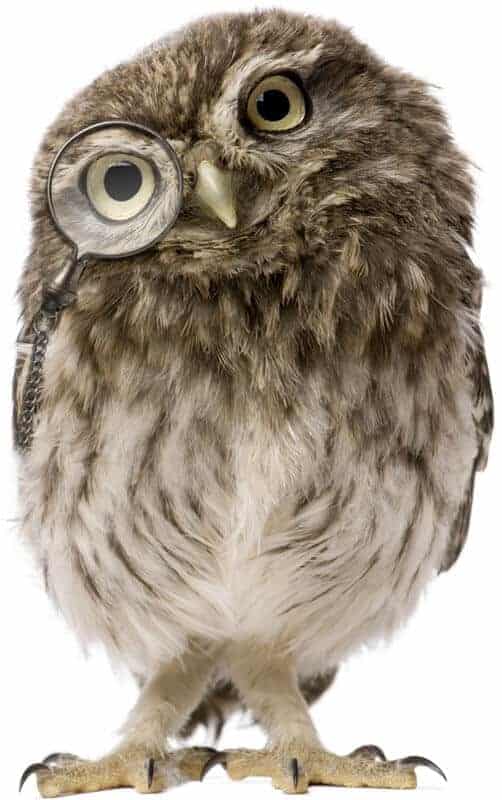
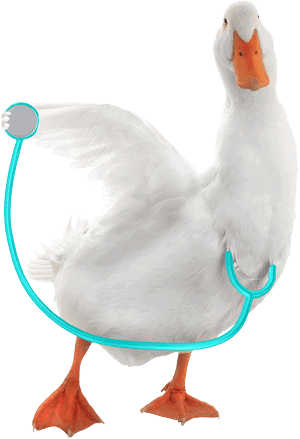
Not sure which course is right for you?
Answer a few easy questions and find out in less than a minute.
Frequently asked questions about placement
Veterinary Nurses are a smart bunch. It’s a job where you’re always learning. Lots of knowledge is needed, but it’s also very hands on. Those puppies and kittens need lots of pats in between all the nursing after all.
Your course will ensure you’re gaining the best knowledge to nurse the animals under your care. But to take care of animals you need to get your hands dirty.
Clinical placement is your chance to put your new knowledge to use. Course requirements also stipulate that you must complete practical based assessments.
Until you have a go at doing things like administering medications or performing a physical examination, your skill level won’t match your knowledge level. Getting the opportunity to practice is what clinical placement is for. Once you’re confident, you can then do your practical assessments.
ACVN Nurses are known for their immense skill and knowledge. It’s why when you graduate you’ll be employable right away. They’re known for this because our course has plenty of clinical experience to really cement your knowledge.Without boring you with lots of scientific studies, real world clinical experience trumps every time.
Veterinary Nursing is a practical job. To be the best veterinary nurse you can, you need to ensure you get plenty of hands on experience in a real veterinary clinic.
You’ll learn much through the Learning Centre and your study resources, as veterinary nursing also requires plenty of knowledge on animal care. You’ll get to put this knowledge into practice when you’re on your clinical placement.
Across the course, you’ll complete 20 days (150 hours) of clinical placement in a veterinary clinic near you. If you’re already employed in a clinic, you can use that instead.
We recommend completing your clinical placement as two lots of two week placements. Your study plan will tell you when the best time is to do this, but we are flexible.
Fitting clinical placement around jobs, family and other commitments is possible. You can structure your placement however it suits you and the clinic. Some students do one day a week, or four one-week blocks. We’re flexible on this.
During your clinical placement, you are covered by The University of Queensland insurance.
It’s important that you are proactive about finding your own placement – this is a quality potential employers are looking for! They want motivated individuals on their teams so we encourage students to contact clinics themselves. It looks much better than your ‘teacher’ or ‘mum’ doing it for you. Many of our Cert III student are lucky enough to secure a job out of their placement. Treat placement as a way to showcase your awesomeness.
We do have a Placement Assistance Program in place if you are struggling to locate placement in your area. This includes professionally written cover letters and resumes, as well as utilising our network of Registered Training Clinics. We also offer incentives and thank you gifts to clinics on your behalf.
We require all students to secure their own placement either prior to, or early in the course.
A part of the experience with ACVN is our level of support. Whilst locating placement is ultimately your responsibility, we won’t leave you high and dry if you’re struggling.
All students are provided with lots of information on the most effective ways to approach clinics. Your CV is checked by our own in-house specialised recruitment educator. We even have a dedicated website full of information for clinics – check out clinical.partners.
Job hunting is a skill, and placement hunting should be considered job hunting (after all you might get employed instead of getting placement!).
If you still need help, we have a placement assistance program available to you once you meet eligibility. This includes professionally written cover letters and resumes, as well as utilising our network of Registered Training Clinics. We also offer incentives and thank you gifts to clinics on your behalf.
We want our graduates to stand out from the crowd, our reputation as having the best veterinary nursing courses depends on it. ACVN Nurses are known for their skill, knowledge, passion and drive. How you find placement is the first impression the clinic will have of you. Make it a good one. Be the dedicated and proactive person they want to hire.
Congratulations!
Nothing needs to change study wise, other than letting us know so we can update our records.
Many of the Cert III subjects are also in the Cert IV. This means you just keep on studying and graduate from the Cert III. After graduation you can enrol in the Cert IV and with all your credits you’ll just keep on going with the new Cert IV subjects.
Easy!
They sure do!
Vets and practice managers love our graduates and courses so much they contact us all the time looking for our students for placement positions and jobs.
We’ve built up a great reputation for well trained nurses. It’s why being an ACVN Nurse is the best option for your career.
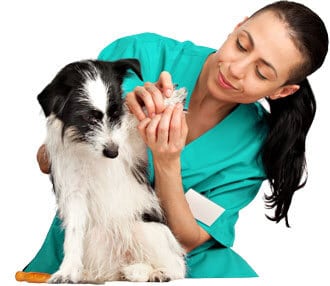

Completing placement is the best job hunting opportunity you will get.
What will I study in the ACM30122
Certificate III in Animal Care Services?
All the subjects marked with a * are in the Certificate IV in Veterinary Nursing.
You’ll receive credit for these when you go on to enrol in your Cert IV. You’ll go straight into second year Cert IV.
Safe Animal Handling Techniques is a whole subject devoted to the correct handling and restraint of the animals in our care. Although a large focus is on dogs and cats, rabbits, you’ll also learn about guinea pigs, birds and wildlife.

Work Health and Safety is a vital element of working in a veterinary clinic. There is a large number of hazards and risks within a veterinary clinic.
Sourcing correct information is the mainstay of not only your study, but working as a veterinary nurse. This subject will take you through how to locate and evaluate sources of information on animal care products and services and medications.
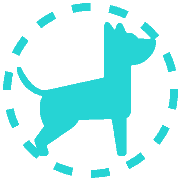
Veterinary nurses care for a variety of animals with differences in anatomy that affect how we nurse our patients. In this subject you’ll learn all about the body systems and how they work.
This subject will take you through what is animal welfare. From exploring some animal welfare issues, various animal welfare models and frameworks, you’ll learn how to use some tools to assess welfare and put plans in place for improvement.
Providing enrichment is essential for animal welfare. This subject looks at the methods we can use for many species to enrich their environment and life. You’ll complete your own enrichment plans as part of your assessment.

This short subject looks at the resources we use each day and how to minimise the impact we have on the environment. You’ll explore the animal care workplace to see what resources are used and how waste reducing measures could be implemented.
This subject credits into the Diploma of Veterinary Nursing.

Correct nutrition is not only vital for the patients we nurse and animals we care for, but advising owners on correct nutrition for their pets is often a daily occurrence for Veterinary Nurses. This subject will ensure students understand what makes up nutrition, how to feed for particular life stages, how to read pet labels, diseases that are influenced by nutrition, and how to calculate energy requirements.
Working in animal care and as a veterinary nurse is extremely rewarding but can take a toll on our own wellbeing as we place the care of animals at the forefront. This subject will make you aware of the importance of looking after your own wellbeing and you will devise a self care plan as part of your assessment.

Veterinary Nurses are required to communicate with a range of people from colleagues to clients. You’ll learn how to adjust your communication techniques to match your audience, including switching between medical terminology and client friendly explanations. You’ll also learn about customer service skills and how to deal with difficult situations.

This subject will introduce you to what to do in an emergency situation when you come across an ill or injured companion animal.
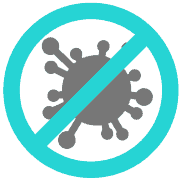
Infection control is extremely important in any veterinary clinic and this subject is structured to help you with understanding both basic and advanced precautions that are necessary to keep you and your patients safe from transmissible diseases.
Patients are often kept in hospital and knowing how to look after them from food to bedding, exercising, taking vital signs, recording observations and knowing when to alert the Vet are all skills that form the basis of good nursing. This subject goes into detail on how to really look after your patients well, providing nursing interventions where necessary, and looking at the patient as a whole – not just ticking off a box that a treatment has been given. You’ll also learn about some of the more common diseases and parasites that we provide preventative care for.

Work placement is where you get the opportunity to learn, practice and master the necessary practical skills. You’ll also undertake your practical assessments there. Read more.


Upon graduation, you’ll have completed eight subjects from the ACM40418 Certificate IV in Veterinary Nursing = around 35% less course cost and 45% less study time.
Nationally Recognised Training
This qualification is delivered by ACVN on behalf of the University of Queensland, trading as UQ Skills, RTO ID: 1511. UQ Skills is the Principal RTO and this course is on the UQ Skills scope of registration, as documented through a written third party agreement. For more information refer to the FAQ.


start your career
PRICE INCREASE ALERT!
At ACVN, we’ve gone to great lengths to delay this announcement, holding off as long as possible. Nevertheless, due to the increasing costs associated with maintaining the exceptional quality of our programs, we find it necessary to make adjustments to our course prices starting in 2024.
January 2024 update:
If you are seeing this alert, then there is still time to secure the 2023 pricing. Enrol today!
start with some savings and no waiting time!
Don’t miss out on this deal!
Pay in full to:
- receive $300 off!
- skip the line and not wait for the next intake!
$6730
$6430
apply now
interest free payment plan
Start your studies at our next intake with a first instalment of $496
Then spread the payments, as it suits you, over a 15-month period.
For example:
15 x $415.60/month or
30 x $207.80/fortnight
That’s an affordable $104/week.
Total:
$6730
apply now
Important notes:
- Please budget approximately $150 to $200 for additional textbooks.
- Prices current from 1st January 2023.
- Prices will increase in 2024.
- All prices include resource fees, tuition, and administration fees.
- When paying in full your start date will be the following business day.
- Additional fees may apply if you do not pass a subject, you need to re-enrol in a subject for any reason, or you extend your enrolment period. Please refer to the student handbook for details on other fees that may be applicable.
- Payment in full discount does not apply to international students. Instead we will cover bank transfer fees at our end, and send out the learner’s guides via international express post at no additional charge.
- For EU and UK residents only: Prices displayed on this page do NOT include VAT. VAT will be calculated based on your country of residence at enrolment time.
Notes on Payment Plans:
- Even if you have completed your studies, you’ll not receive your certificate until you’ve paid for your course in full.
- You are also responsible for paying the entire course cost, even if you decide to not complete the full course.
- When you choose to enrol with an interest free payment plan, your studies will start at the next available intake.
- Instalments will start from the month your course commences. Payments are by direct debit or credit card only, and to make your life easier, you can elect the day the automatic payment is debited from your account.
- If you fall behind in your instalments by more than 14 days without arranging an alternative payment, you may be withdrawn from the course. So it’s important to contact us if you are struggling.
- International students are not eligible for instalment plans.
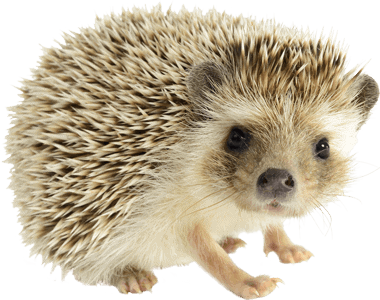
Did you know that not every Certificate III is as vet nurse focused as ours?
As an ACVN graduate you’ll be in the perfect position to land your dream job.
Our students are raving about our courses!
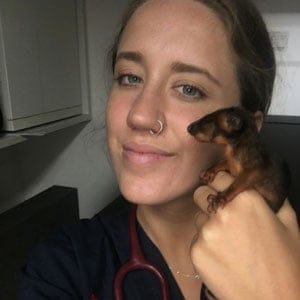
ACVN allows me to have a work/study/life balance as I can complete my course around the pace of my chaotic life.
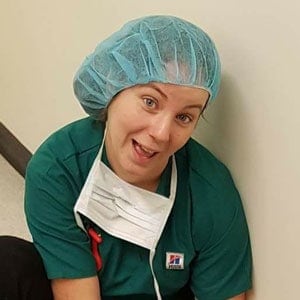
Because of my studies I started as a placement student in a clinic and as a result of this I was offered employment.
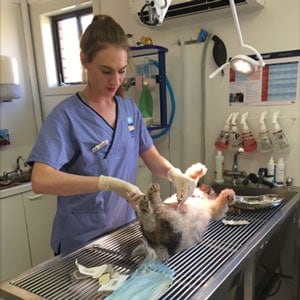
I love the support offered by the nurse educators and fellow students. It’s very different to university where the information is thrown at you and lecturers are often too busy for one on one help. The flexible study schedule makes study and full time work easy to manage. I started placement in February 2016, the staff are amazed by how broad my knowledge is and how in depth the studies go. I’ve already been told that when I finish my studies, they want to create a position for me.
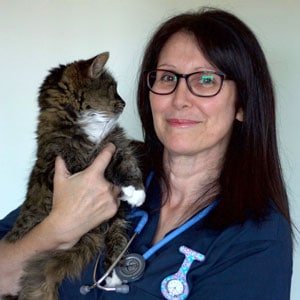
I’m middle aged with 3 adult kids and a varied work history. I decided when I turned 40 that I really wanted to work with animals. I chose online studying for the convenience of working to my own schedule. From my comparisons with colleagues studying with other RTO’s I think the ACVN course was much more comprehensive. My goal was to end up as a carer in a non-profit/rescue organisation and in March 2017 I accepted a job with the RSPCA client services across adoptions, admissions and clinic.
OVERSEAS STUDENTS WELCOME!
You don’t need to be living in Australia to study with us. We welcome students from all over the world! You have the same student benefits as a local student, and we don’t charge you huge fees for being overseas. There are however, some considerations you need to factor in before enrolling with us. Please read the Overseas Student Information by clicking the button below.
Learn more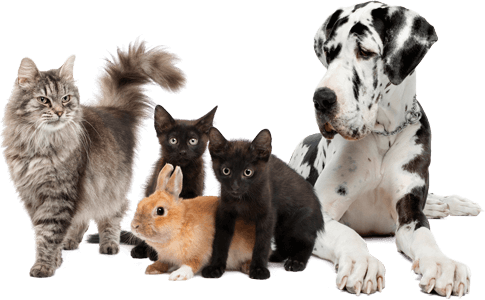
download a brochure
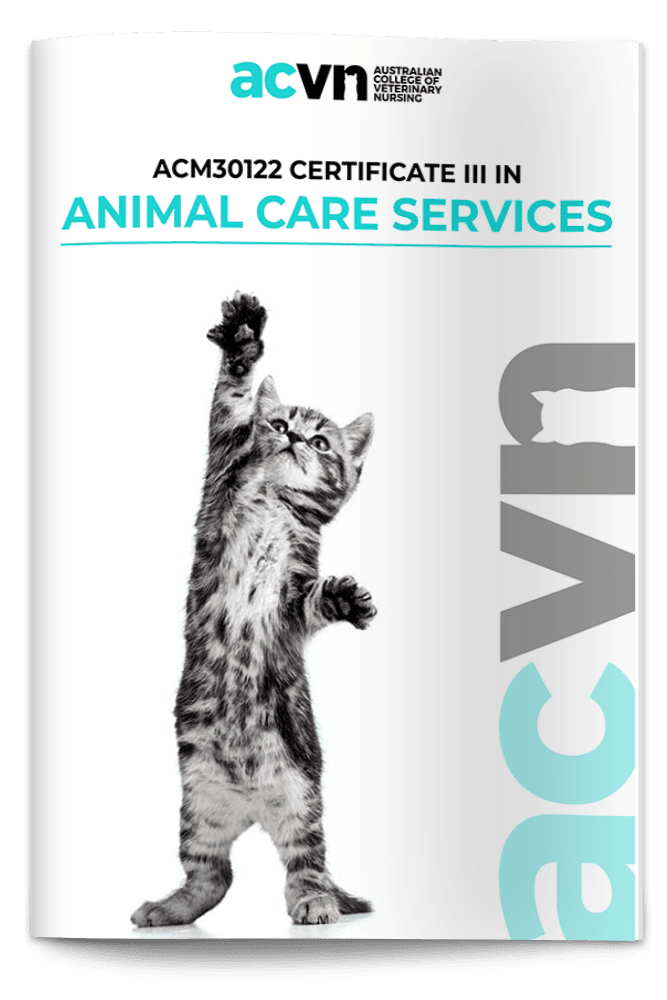
COMPLETE THIS QUICK FORM AND WE’LL SEND YOU THE BROCHURE
ALONG WITH SOME INFO TO HELP YOU DECIDE IF THIS COURSE IS FOR YOU.

